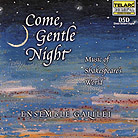August 2001
The lack of documentation might tell us that incidental music was probably not of the utmost importance to the theater, or to the Bard himself. Yet the abundance of music from that period -- and the tantalizing clues within the plays -- makes guessing Shakespearešs musical intentions an intriguing game. Ensemble Galilei's Come, Gentle Night: Music of Shakespeare's World eschews the conventional yet popular repertoire of Shakespeare contemporaries Thomas Ravenscroft, Thomas Morley and John Bull, assembling instead a number of jigs, reels and flings from that era, as well as several original compositions -- all of which are played in the group's hybrid-collegium/Celtic-folk-ensemble style. The material is treated with a new-age sobriety and stillness, creating a measured and cautious effect rather than one that should be more exhilarating. The original compositions, which are set to Shakespearean scenes and soliloquies, are evocative of the style of the 16th century, but are not compositionally meaty. The strongest of the group is Liz Knowle's piece "Rumble Thy Bellyfull." She is an excellent fiddler, and she uses uneven tempos, shifting tonal centers, and lively percussion as she describes King Lear's rage. This piece is unfortunately offset by percussionist Jan Hagiwara's composition "The Asp," which is a handbookish attempt at depicting Cleopatra's final moments. The other able performers of the ensemble, Deborah Nuse (Scottish pipes and fiddle), Carolyn Anderson Surrick (viola da gamba), and Celtic harpist Sue Richards, also contribute compositions here with only slightly better results. This album was beautifully recorded using Telarc's Direct Stream Digital system, and is notable for the clarity and honesty of the sound. Despite the slight excess of reverb from the hall, the Telarc crew kept the widely varying characters of the instruments separate and distinct. Most noteworthy is the recording of the Celtic harp, which can be easily lost beneath the fiddle and double reeds. On this recording, it is distinctly present, yet it retains its delicacy -- an excellent coup of microphone placement and engineering. While sonically superb, this album lacks musical weight. It can, however, be enjoyed by early music enthusiasts, and certainly adds another valid opinion to the debate over Shakespeare's music. GO BACK TO: |
 Ensemble Galilei - Come
Gentle Night: Music of Shakespeare's World
Ensemble Galilei - Come
Gentle Night: Music of Shakespeare's World![[Reviewed on CD]](../format/regcd.gif) The
thorny question of what music may have accompanied the original productions of
Shakespeare's plays has sparked lively debate for decades without generating definitive
answers. Composers who were contemporaries of Shakespeare are well known to us; however,
there is still uncertainty as to what music accompanied the earliest performances of the
Bard's plays.
The
thorny question of what music may have accompanied the original productions of
Shakespeare's plays has sparked lively debate for decades without generating definitive
answers. Composers who were contemporaries of Shakespeare are well known to us; however,
there is still uncertainty as to what music accompanied the earliest performances of the
Bard's plays.